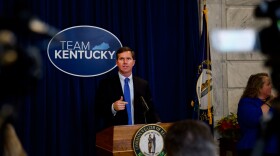For more than 500,000 Kentucky kids, school isn’t just a place to learn, it's also where students can reliably get two hot meals a day through the federal National School Lunch program. With schools closed to slow the spread of coronavirus, districts have had to get creative about getting meals to kids.
Outside Rangeland Elementary, a staff member and volunteer are handing out shelf-stable meals to a circle of young students, all bundled in winter coats. The meals are essentially snacks wrapped together in crinkly clear plastic.
Smyrna Elementary School student Rylee Jackson and her brother came here with their mom, Katina Jackson. They rummage through to check out what they got: Goldfish crackers, applesauce, cheese, carrots, milk and some animal crackers.
Jefferson County Public Schools (JCPS) has opened 45 sites like this across the district, where families can walk up or drive up and get both breakfast and lunch for each child. Most sites are open 10 a.m to 1 p.m., Mon.-Fri. You can find a list of those locations and hours here.
You can also call 313-HELP for assistance from the district as a parent, student or JCPS staff member.
Julia Bauscher oversees child nutrition for Jefferson County Public Schools. She says two-thirds of the district’s 100,000 students rely on school for two meals a day, subsidized by the federal government.
"That need doesn’t go away if they can’t come to school," Bauscher said. "So we want to make sure they have the option to get a healthy breakfast and a healthy lunch while schools remain closed."
Bauscher said the district is prepared to keep offering these meals as long as it has to. JCPS superintendent Marty Pollio warned in a press conference Monday that school could be out past the planned three-week period.
"There is a strong possibility that being out of school will last longer than April 6," Pollio said, noting that the CDC now recommends avoiding gatherings larger than 50 people until at least May 8.
Bauscher said the district has run into some problems getting the items they need for the shelf-stable meals because of increased demand for them from districts across the country.
"We're all doing this," she said. "There's a strain on the supply chain."
But, Bauscher said, she believes the district has other options if their usual suppliers fall through.
Mom and JCPS teacher assistant Tacoma Blackmon picked up meals with her six children. She said she's glad she can continue getting this service, even though schools are closed.
"Sometimes your circumstances don’t grow with your children. And my kids can eat," Blackmon laughed. "So, I believe it’s an absolute blessing to have this program."






